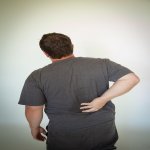The positioning of the spine and pelvis may have an effect on one’s likelihood of suffering from low back pain.
A new study compared 796 back pain patients to 927 healthy controls to determine if posture had any influence on back pain. The study found that subjects with a notable loss of lumbar lordosis were more likely to suffer from major disc herniation, and these individuals also had a higher risk for back pain.
Conclusions
Many people have doubted whether there is actually a connection between posture and back pain. This study does provide evidence that in some cases, posture can be a risk factor.
What is interesting, however, is that this study only found a connection between lack of lordosis and back pain. In my experience, most clients have what is deemed as “hyperlordosis” and many treatment protocols are designed for decreasing anterior pelvic tilt. Unfortunately, this study did not uncover any links between hyperlordosis and dysfunction.
References
